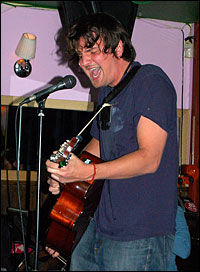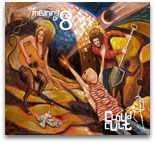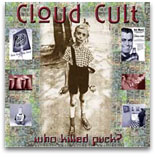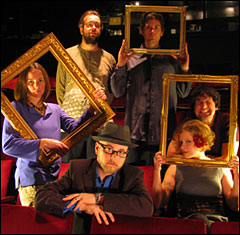
Craig Minowa.
Imagine the soaring tribal rock of Arcade Fire, the head-nodding beat-pop of Postal Service, and the arty skronk of Modest Mouse, strung together in a loose-limbed, lo-fi pastiche. Toss in half a chamber orchestra and some found-sound collages, and top it off with vocals of almost childlike guilelessness and yearning.
That, in a nutshell, is Cloud Cult, a quirky little band out of Minnesota that in the last few years has emerged from obscurity into improbable indie success. Their last album, Advice from the Happy Hippopotamus, was an out-of-nowhere college-radio smash that brought major labels courting. That interest is only likely to increase with the release last week of the band’s new album, The Meaning of 8, an artistic leap forward that melds the eccentricities beloved by long-time fans with accessible, unshakeable melodies.

The Meaning of 8, Cloud Cult’s newest album.
Rarely has major label pursuit been so futile. Cloud Cult’s DIY values go well beyond home-studio noodling into deeply committed green territory. The band records and produces its music on the organic farm of band leader, principal songwriter, and singer Craig Minowa. The northern Minnesota farm — also Minowa’s home and the offices of his nonprofit music label Earthology Records — is heated entirely with geothermal energy. Early albums were shipped in recycled jewel cases, cleaned by hand by the band; since then, Earthology has developed a full range of eco-friendly packaging and reproduction services that it offers to other bands.
Minowa and crew are now headed out on tour in their biodiesel van. Grist will be co-presenting (with radio station KEXP) the band’s shows in Portland and Seattle. I caught up with Minowa by phone.
Which came first, environmental awareness or love of music?
I’ve been directly involved with music for longer. I took piano lessons as a little kid, and didn’t work in the environmental movement until early high school. But the passion for both grew together. I love both of them so much; I just don’t feel like a complete person if I’m not doing both.
Were your parents environmentalists?
No. They weren’t specifically environmentalists; it was a conservative Christian family. The birthing ground for the environmental tendencies was when I was young. I was kind of a freakazoid of the community, one of the kids that got picked on and beaten up by everyone. So I would go hang out in the woods. There’s a tree I could climb but no one else could climb, so I spent a lot of time up there. Over the years I found a lot of solace and friendship out in the woods, and as I got older it felt like something I wanted to protect — my sacred ground.
You got your degree in environmental science. How much experience did you have in the movement before you jumped over to music professionally?
All through college I was doing volunteer work with environmental groups, trying to find my niche in the environmental field. I ended up working with nonprofits, doing environmental education, even some work with the Minnesota Department of Natural Resources — all over the place, testing different things out. I found my niche working with smaller nonprofits. That’s where I’ve been ever since, and I love it.
What is Earthology?

Who Killed Puck?, by Cloud Cult.
I’d been organizing environmental festivals — Earth Day events, things like that. I started feeling it would be fun to have a nonprofit focused just on doing that type of thing, entertaining events that are environmentally focused; that could be a connection between my passion for music and my passion for the environment. It didn’t come together until I finished Who Killed Puck? I realized there was no way to manufacture that CD in a way that made me feel comfortable. It came down to, do I just put this album I worked four years on in the drawer because I don’t feel comfortable making albums out of plastic crap? Or is there a way to manufacture this in an environmentally friendly way?
I spent a lot of time asking questions, doing research into different types of production processes for CDs. At the time, CDs were relatively new on the market. I realized the only way to have an environmentally friendly plastic jewel case was to get used ones. People were dumping them off at local landfills all the time. I put boxes out at college bookstores; students could drop their used jewel cases in there. I have those shipped back to Earthology and can release my CDs that way.
The donated jewel cases started coming in a lot faster than I expected, so I figured I would turn it into something for other musicians interested in having their CDs manufactured in the most environmentally friendly way. It branched out all over the place, from working with the University of Illinois to get the biopolymer shrink wraps developed to figuring out ways of having the plastic trays be made out of hemp, and working on trying to get that biopolymer CD, which didn’t end up working out.
The disc itself?
It’s the last element that still isn’t as environmentally friendly as I would like.
What do you do to reduce your impact once you’re out on the road?

Cloud Cult.
Photo: cloudcult.com
It’s getting a lot easier for bands to tour in an environmentally friendly way. When we started to tour, I had a lot of ethical dilemmas — you’re exhausting so much gas, and energy in general. But NativeEnergy offers a program where you can have a carbon-neutral tour; you just figure out how much gas and energy you’re using and they figure out how much wind power you need to pump back into the grid to balance that out. We also go to American Forests and calculate the amount of CO2 we put into the atmosphere, and plant enough trees to absorb that. The catch with that is, when you plant, say, 100 trees, the number of trees that are actually going to survive their entire life and absorb all that CO2 is less than 30 percent. You go to places like American Forests and figure out what you need to do for planting trees — and multiply it times three.
Then we’ve got solar panels on our van, and we just purchased a van that we’re able to do biodiesel with.
What do you do with the solar panels?
The panels pump into batteries inside the van, and those batteries power everything we’re using in there. A couple of us do nonprofit environmental advocacy work while we’re on the road. We do the shows at night, then while we’re traveling from city to city we’ll be on our laptops and cell phones doing our regular environmental nonprofit work. The solar panels power our laptops and our cell phones. Technically, the battery storage is enough that we could plug our amps in there — we could do a full outdoor set on that.
Is the band a nonprofit entity?
Earthology is getting its 501(c)3. The band is discussing going 501(c)3 too.
How do you feed yourself?
Just like with any nonprofit, like Sierra Club or Greenpeace, people on staff are getting paid a modest salary. Once you’ve paid everybody their modest salary, and paid the bills, if you have something on top of that you don’t go out and buy a Lamborghini; you do something good with it.
How did you stumble on geothermal energy?
When my wife and I moved out here, everything hit the fan right away. The roof started leaking all over the place; the furnace exploded; the car exploded. We did some research into alternative methods of heating the home, and geothermal seemed like the best option. It was interesting — with government subsidies, it ended up costing not a whole lot more than it would to install central air and a furnace. And geothermal cools the home in the summer. Anybody who’s building a new home could install geothermal for the same price as air conditioning and furnace. It’s one of the things I recommend to everybody.
The biggest problem we’ve had is, the house is older so it’s not all that energy efficient. We’d like to be fully off the grid. We have floor plans for an earth home worked out. We’re looking for the land; we’re hoping to start construction by this summer/fall. With the earth home you have 50 percent more energy efficiency, so the geothermal would be working half as much as now. With that, we’d be able to power the geothermal with the new backyard wind turbines or a photovoltaic system.
The Earthology offices are also in your house?
Yeah, everything’s here. We need to build another out-building to hold all the used jewel cases coming in. [Laughs.] There’s boxes everywhere.
I have this picture of you sitting in a room somewhere with paper towels and squirt cleaner for hours on end.
That’s totally accurate. We clean them with water and vinegar, case by case. We figure, with how much energy and petroleum it takes to manufacture a brand new case, the amount we’re using to hand clean them is actually pretty minimal. It feels like penance, in a way, for the bad things we’ve done in our lives to the planet.
What happens if you bust out on the pop charts with this next album? How’s it going to scale up?
Earthology now does 100 percent post-consumer recycled cardboard CD cases. That’s helped a lot. When we’re shipping them to radio and magazines, with a cardboard case we can just slap a stamp on there and put it in the mail. The plastic ones, you have to buy the recycled mailers for that. You end up with more packaging.
Why not move to 100 percent downloads and eliminate the need for physical packaging altogether?
It’s definitely one of the benefits of the music industry combining with the internet. With the new album, we did a pre-release where people could download it. I loved it — people would pay a smaller amount, and we wouldn’t have to make any kind of product. The energy efficiency and benefits to the environment with that is just mind-blowing. It’s the future of the industry.
Do you feel like your advocacy has impeded your success?
In some ways it has and in some ways it hasn’t. When we were first starting to get decent college radio play, I found out that it’s a lot less popular to have an environmental message, or to follow an environmental path, than I had assumed. We were getting interviewed by some hipster magazine, and I remember the interviewer asking, “Is it hard for you to bring music to this hip crowd when you have the stigma of this hippie image?” I was thinking, “Is that bad?” [Laughs.]
So that initially hurt us. We realized it was something we don’t necessarily need to wear on our sleeve. We’re doing this because we believe we have to do it. There’d be no reason to pursue this career option if we weren’t doing it. Cloud Cult fans don’t necessarily realize all we’re doing to try and reduce our footprint, and I think that’s OK. For those fans that are interested, they seek out that information — they’ll email us, or ask us at shows, and we can yammer on and on about it.
Have you consciously dialed back the advocacy in your music?
Yeah. Who Killed Puck? had some pretty strong environmental messages in it, and the project I was involved with before that was even more message. Over time, it just felt like everybody’s getting preached to all the time. The information is out there; we have a lot of reading material at shows. I am just not comfortable with soapbox preaching. I’d rather teach by example than by preaching, so we’re trying to build a good business model that other bands can emulate.
Environmental music has a stigma as dirty as Christian rock had about 10 years ago. Christian rock has gotten a lot better, but think about 10 years ago: you know they’re going to have a message, but the music’s probably gonna suck. A lot of people think that about any band with a message. You can only hear so many songs with the chorus, “Let’s go recycle.” [Laughs.]
What do you think the environmental movement is doing right and wrong?
The biggest thing is shifting the messaging. When the environmental movement first started sparking up in the ’60s and ’70s, the messaging was “down with this and down with that.” At the time, that type of thing was necessary — it got things rolling. I think it’s changed. People have an aversion to that now, because we’re so inundated with it. People want solutions; they want to feel good about what they’re doing. It’s not as helpful to go out and say, Wal-Mart organics are horrible. It’s more helpful to say, it’s better for you to stop at the farmers’ market or the co-op — offer those solutions.
The same thing with global warming. It can be overwhelming to read all the information about what’s happening. Give people real, tangible, and effective solutions they can put into their everyday life. It is so important; everybody wants to do good. They just need the solution.
Does the band get involved in politics?
We’re pretty vocal on stage about how we feel. There are some points that just need the limelight. We don’t specifically endorse any candidate. If one comes along we totally fall in love with …
What if Gore decides to hop in?
We would be all about Gore.

